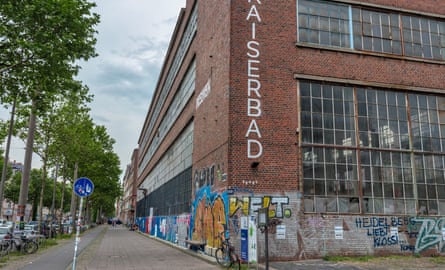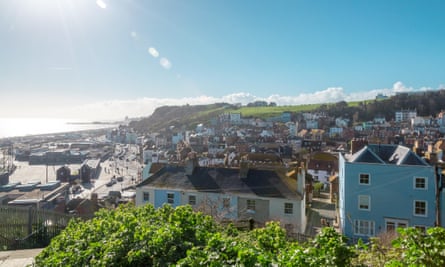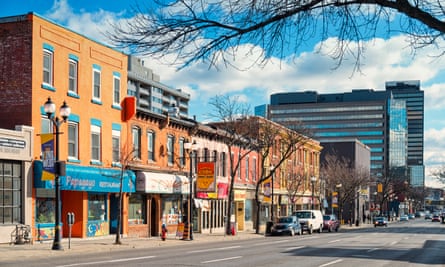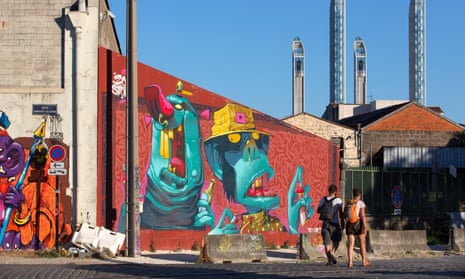As the spring sunshine beams down on the honey-coloured buildings of Bordeaux, few of the tourists on the terraces pay much attention to the sticker on the lamppost. “Parisien rentre chez toi,” it declares – “Parisian go home” – accompanied by a graphic of the new high-speed train that now connects Bordeaux with the French capital in just over two hours.
Last summer’s opening of the TGV route sped up more than just the travel time between the cities. Gentrification had long been underway in Bordeaux, a by-product of mayor Alain Juppé’s much-vaunted regeneration of the city – including the cleaning up of the famed architecture, a new tram system and the mega-museum La Cité du Vin. Since the arrival of the high-speed rail link, however, well-heeled Parisians – lured by the sunny skies, slower pace of life and lower property prices – have been moving en masse.
More than 70% of Bordeaux’s new arrivals are from the Paris region, and Bordeaux is now one of France’s most expensive cities for older apartments, with a median price of €3,730 per sq m – up 12% year on year. The rents have followed suit.

Indeed, Julie Tayac, 39, and her partner, Cédric Tournemire, 41, found it so expensive that they had to move to Salaunes, a village 26km out of Bordeaux. Tayac had to leave her job, and Tournemire now has an hour’s commute.
“I have been applying for jobs ever since, but no one wants to employ someone who lives so far away,” Tayac says. “It’s actually only a half-hour drive when the roads are quiet, but the traffic has become terrible over the last couple of years. So now, because of the rents and the traffic, I’m living in the middle of nowhere without a job.
“I see Bordeaux changing and not for the better. The population keeps increasing, but not the infrastructure. The traffic is a nightmare and the rents have gone wild. It’s such a shame because this city was so nice to live in before.”

She stops short of blaming Parisians outright, but others are more critical.
“Only the very rich can live in Bordeaux now – and many of these newcomers are Parisians,” says Vincent Bart, who co-founded the anti-Parisian Facebook page Front de Libération Bordeluche face au Parisianisme (the Bordeaux Liberation Front Against Parisianism).
“In truth, though, saying we are ‘fighting’ Parisianism is a humorous way to denounce the fact than an entire city is being sold out. We are not actually mad at Parisians, who enjoy freedom of movement as all European citizens do. We are mad at the municipality of Bordeaux for driving its poorest residents away into increasingly remote suburbs.”
Bart’s page has more than 8,000 followers, but “double gentrification” is by no means a phenomenon unique to Bordeaux. As global urbanisation makes city centres increasingly expensive, cities worldwide are starting to gentrify their neighbours. As London once drove up rents in Shoreditch, now Shoreditch is doing the same to Margate; the same is happening with Berlin and Leipzig, Toronto and Hamilton and dozens of others.

“It’s the same story in New York City, where the gentrification pushed rents up so high that artists found they could no longer afford to live there,” says Loretta Lees of the University of Leicester, the author of several books on gentrification. “So, instead, a number moved to Detroit – and in turn their activities have been seen to trigger gentrification there.
“Similarly, gentrifiers in Silver Lake, in Los Angeles, moved there because it reminded them of other gentrified neighbourhoods they were familiar with, such as Williamsburg in New York City and even Kreuzberg in Berlin.”
In Britain, there is evidence that gentrifiers have been leaving London for Leeds and Birmingham in the past decade. More recently, Lees says, the phenomenon is affecting small coastal towns and cities such as Brighton and Margate, and where locals call the new arrivals DFLs (Down-from-Londoners).

Hastings, in particular, has been dubbed the “Shoreditch of Sussex”. Its faded Victorian splendour, newly renovated pier and comparatively cheap property have proved a heady combination for Londoners – who have also garnered another unfortunate nickname among locals: FILTH (Failed in London, Try Hastings). Here, too, prices have risen fast. According to the data specialists CACI, the average house price in Hastings increased by 18% between 2015 and 2017.
Now, just as in London, the city is having to take steps to see off the worst of the property speculation and exclusion that are gentrification in its worst aspect. Opened in 2016, Rock House is a mixed-use building that combines affordable living, capped-rent working areas and a collaborative creative space, open to people who meet the criteria of “need, enthusiasm, contribution and local connection” – particularly to the wider community.
“We could all feel that gentrification was on its way to Hastings, and we were deeply concerned,” says Jess Steele, director of White Rock Neighbourhood Ventures (WRNV), the collaboration of three social enterprises that own Rock House. “It’s not that we are anti-Londoners or trying to put a gate up – after all, you can’t blame people for wanting to come to lovely, cheap and creative Hastings – but we are against gentrification. So, it seemed to us that the best way to deal with the worst effects of this was to create at least some affordable places to live and work, and to protect them in perpetuity.”

The new energy has its upsides, argues Randall Hansen, director of the University of Toronto’s Munk School of Global Affairs, who studies human migration.
“Like most things in life, gentrification – in all its forms – can be both good and bad,” he says. “People are displaced, to be sure, but gentrification can also breathe new life into cities: crime falls, crumbling houses are renovated, jobs are created, and the overall look and feel of the area improves markedly.”
He points out that the housing crisis in Toronto has seen residents turn to neighbouring Hamilton, an industrial city roughly one hour’s commute away that had fallen on hard times. “As a direct result of Toronto’s gentrification, Hamilton too is gentrifying – and I think you’d be hard-pushed to find anyone who would see that as a bad thing.
“It’s a similar story in Berlin, where I also used to live. Twenty years ago, Leipzig was a dying town that was losing population. However, as Berlin gentrified, people looked to Leipzig – and, in 2015, more people moved from Berlin to Leipzig than the other way around for the first time.”
In Bordeaux, however, many of the locals struggle to see the benefits of this knock-on gentrification. “There is no miracle answer to the problem,” says Bart. “We are mainly asking our elected officials to stop selling our city to outsiders because the process is so destructive.”
Follow Guardian Cities on Twitter, Facebook and Instagram to join the discussion, and explore our archive here

Comments (…)
Sign in or create your Guardian account to join the discussion